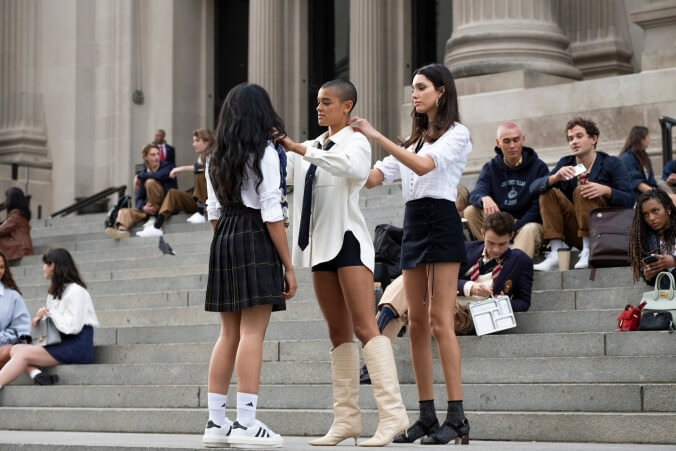10 years after the original Gossip Girl's finale, what's the show’s legacy?
Hint: It’s something the HBO Max reboot can’t recapture

It’s the start of my senior year of high school, and I’m wearing a headband, a skirt, and boots, even though it’s 80 degrees outside. I am both deeply insecure and feel like hot shit, which tracks, because the style icon I’m channeling is Blair Waldorf. The year is 2008, and Gossip Girl—declared “Mind-Blowingly Inappropriate” by the Parents Television Council—is the biggest show on television, at least in my 17-year-old brain.
It doesn’t feel like that long ago, but if you need a reminder of how different the world looked in 2008, in the back row of honors chem, my best friend often watched episodes of Gossip Girl on the 2-inch screen of her iPod nano. We were the same “grade” as the characters, and we adopted their music, their slang, and (cheaper versions of) their fashion as our own.
It’s hard for me to pinpoint why we were so obsessed with it. We were in the middle of a financial crisis that would define our generation, but for the time being, mostly sheltered from its effects. We all had Facebook, but only the richest kid in our class owned an iPhone, and Instagram was still years away. We weren’t yet overthinking captions or documenting our every move. The original Gossip Girl was similarly unbothered with flaunting wealth or saying the wrong thing or lacking any moral righteousness. In case you’ve forgotten, one of the most beloved characters of the show tried to rape someone not once but twice in just the pilot. Gossip Girl was a fantasy where financial anxiety didn’t exist and consequences didn’t apply, and we loved it.
The reboot, for all its improvements in its currently airing second season, does not quite understand this. Or maybe it does but is unable to contend with it. Its characters live in a world of Instagram and TikTok, sponsored content and curated brands, cancel culture and unconscious bias training. These teens overthink and post whereas our old ones acted (stupidly). Not to make this all about me, but it’s as if the original were a teenager, and this new version is a 30-something. We’re just less fun to be around.
Ten years ago this week (on December 17, 2012, to be exact), the original show aired its finale, a truly insane hour of television that included two weddings and finally unmasked Gossip Girl. I was a senior in college and supposedly so were the characters, although you would not know that from the plot. At the time, I tweeted, “If the end of Harry Potter meant the end of my childhood, the end of Gossip Girl means … something. The end of poor, adolescent choices?” I was saying goodbye to a specific era of my life.
In the decade since, Gossip Girl has spawned memes and think pieces. It’s still considered iconic, but what made it so? It was not the first show to make New York City “a character” or expose us to the lives of the uber-wealthy. It did not invent the teen soap or even take it to the furthest limits of the genre. I would argue that every generation has its beloved teen show, one that serves as a cultural touchpoint and a relic of their youth. In fact, airing on The CW alongside Gossip Girl was 90210, another reboot of another “iconic” teen drama, one that couldn’t recapture the cultural influence of the original.
Is the legacy of Gossip Girl the DNA it passed on to the teen shows that came after? Can we thank it for the anonymous threat of Pretty Little Liars, the sexual frankness of Sex Education, the chaos of Riverdale, and the darkness of Euphoria? Not really. You can trace that strand further back than Gossip Girl to shows like Buffy The Vampire Slayer, My So-Called Life, Freaks and Geeks, Dawson’s Creek, Degrassi, and on and on and on. Gossip Girl is not the grand matriarch of drama, but a notable presence in a long heritage of drama queens.
So what is the legacy of Gossip Girl? For me, it’s the headbands.
No, hear me out. In 2008, headbands swept through my high school. We all had them and we all loved them. In 2022, headbands are having a bit of a moment (how many of your friends wore them in their Thanksgiving Instagram posts?), but I still can’t bring myself to buy one because I am haunted by the specter of Blair Waldorfs past. It’s been 10 years, and I can’t let it go.
There are other things too. That when I’m being devious in the group chat, I’ll sometimes throw in an “XOXO.” That my friends and I are obsessed with Penn Badgley and his TikToks. That when the aforementioned best friend and I planned a weekend in New York, we had to get an ironic-but-not-ironic picture on the Met steps. That I can hear specific songs—“The Ice Is Getting Thinner” by Death Cab for Cutie or “Apologize” by One Republic, for example—and be immediately transported to a specific Gossip Girl scene. It was getting older and having to actively reject the way my teenage brain was wired to think Chuck and Blair were relationship goals.
Like I said, I think all generations have their version of this, a show that comes along at the right time to worm its way into your brain during a very formative period so that you’re still discovering all the fingerprints it’s left on your life years later. When Gossip Girl aired its finale in 2012, I thought I was saying goodbye. Little did I know, I was stuck with that bitch for life.